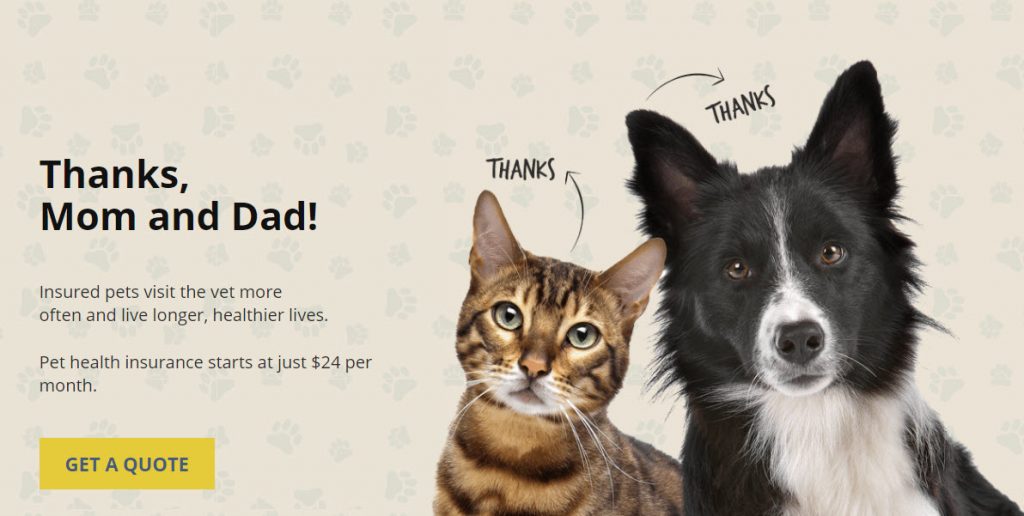5 Ways to Ease Separation Anxiety in Your Dog
Free Pet Insurance Comparison
Compare Quotes From Top Companies and Save
Secured with SHA-256 Encryption
Dr. Pippa Elliott BVMS, MRCVS
Veterinarian
Dr Pippa Elliott BVMS, MRCVS is a veterinarian with over 30 years of experience in companion animal practice. In 1987 she graduated from the University of Glasgow, with a degree in veterinary medicine and surgery. She works at Blythwood Vets and the People’s Dispensary for Sick Animals (PDSA). Pippa is an advocate of Fear-Free Practice, an animal addict, and a veterinary writer. She is also w...
Veterinarian
UPDATED: Dec 16, 2023
Pet Insurance U receives compensation from the third parties included on this site. This includes payment for clicks from our site to insurance providers’ sites and quote requests generated. Our rankings and reviews are not affected by payments from the insurance companies. The compensation we receive allows the site to be free and regularly updated. Our goal is to review every pet insurance provider, but not all companies are listed on the site.
And many of the companies we review do not pay us anything. We simply rate, compare and review their plan because we feel it will be valuable to you. Our reviews are guaranteed to be unbiased, professional and advertising compensation does not influence rankings.
We are a free online resource for anyone interested in learning more about pet insurance. Our goal is to be an objective, third-party resource for everything pet insurance related. We update our site regularly, and all content is reviewed by pet insurance experts.
UPDATED: Dec 16, 2023
Pet Insurance U receives compensation from the third parties included on this site. This includes payment for clicks from our site to insurance providers’ sites and quote requests generated. Our rankings and reviews are not affected by payments from the insurance companies. The compensation we receive allows the site to be free and regularly updated. Our goal is to review every pet insurance provider, but not all companies are listed on the site.
And many of the companies we review do not pay us anything. We simply rate, compare and review their plan because we feel it will be valuable to you. Our reviews are guaranteed to be unbiased, professional and advertising compensation does not influence rankings.
On This Page
The big eyes, the hysterical barking, the whining, the destruction of property–separation anxiety in our canine companions can be as stressful and emotionally draining for us as it is for them.
Unfortunately, what works for humankind isn’t exactly what works for our dogs, therefore in our attempts to repeatedly comfort and assure our dogs, we often unintentionally reinforce that time away from each other is the worst possible thing in the world, and that anxiety can build into a never-ending cycle.
Luckily, by being cognizant of our behaviors and creating a comforting routine, we can reduce our dog’s fears and live a happier, healthier life. Here are five steps to get you there.
Need Pet Insurance?
FACT: Pet insurance pays up to 90% of vet bills when your pet is sick or injured!
#1 — Created Routine to Destroy Anxiety
The anxious dog needs a routine he can trust and rely on. Provide this to the best of your ability by scheduling his feedings, walks, and playtimes as regularly as you can.
Most importantly, develop a routine when you exit and enter the home. This way, your dog can begin to anticipate when you leave the home–and know you will return.
Enter your ZIP code below to view companies that have cheap pet insurance rates.
Secured with SHA-256 Encryption
#2 — Hold The Emotions
Sometimes it’s difficult not to lavish our dogs with goodbye kisses and hello hugs, but this display of affection is a major trigger of anxiety for them.
The big to-do of a dramatic exit and entrance signals to our dogs that when we leave, it is a very big deal, and when we return, it is a very big deal, and all this drama makes every separation an anxiety-ridden nightmare.
Practice your routine before you exit–whether it’s a quick walk, a chew toy, going into the crate or turning on the radio–and then say a simple, calm goodbye. When you reenter the home, enter with that same calm energy.
Related: 10 Things You Must Know Before You Buy Pet Insurance
Do not respond to his excited greeting–you want to reinforce your reunion is just another expected, normal part of daily life. After he calms, then give him a cuddle.
Don’t feel guilty–you won’t hurt his feelings. These calm, strong responses are telling him you are in charge and everything is ok.
#3 — Exercise to Decrease Anxiety
A dog of any age needs exercise to calm the mind, distress the nerves, and tire the body. Whether it’s swimming, dog parks, agility classes, or jogging, make exercise a priority and an enjoyable part of your daily routine.
If you are dealing with a young, exuberant dog or you are simply pressed for time, consider hiring a dog walker or enrolling in dog daycare.
Real Cost Savings from PetFirst Clients

Luna
PetFirst saved his parents
$6,712
A happy energetic Luna one morning couldn’t hold her food down. After months of multiple costly vet visits to specialists and an endoscopy, the problem was discovered and fixed. Luna put 22 pounds back on in no time and her parents were grateful for having PetFirst by their side to pay the bills.
#4 — Try Different Things to Reduce Anxiety
If you’ve developed your routine and established a calm environment and your dog is still experiencing heighten separation anxiety, there are a number of options to explore: specially formulated music, such as Through a Dog’s Ear (throughadogsear.com), dog appeasing pheromones, such as Adaptil collars, or homeopathic calming aids, such as Rescue Remedy.
Wireless camera, such as the Samsung SmartCam, are relatively inexpensive and allow you to monitor your dog in your home from your mobile phone–you can even speak to them through the app to reassure them if you observe anxious behaviors arising.
Enter your ZIP code below to view companies that have cheap pet insurance rates.
Secured with SHA-256 Encryption
#5 — Contact Your Vet If Anxiety Isn’t Improving
Medication is often a last case resort, but there is no shame in investigating this option for a highly anxious dog. It can make a huge difference in your dog’s behavior.
As American doctors are seeing dramatic increases in anxiety cases among their own patients, so too are veterinarians and dog trainers. The good news is as our lives increasingly intertwine with our canine companions, we possess the gateway to their well-being and happiness.
Through these learned methods, we can greatly improve the lives of our best friends–so that they can be there for us too.
This is only some of the wonderful tips we have on caring for your furry buds. If you need more tips, be sure to check out our blog.
Other articles you may find helpful:
Is Exotic Pet Insurance Necessary?
The Best Pet Insurance By State
Fun Facts, Dog FAQ, And Unsolicited Dog Advice
5 Training Commands to Save Your Dog’s Life
The Ultimate Guide to Safe Foods for Dogs
We get it, your dog is like your child and when your puppy or dog has health problems it is scary. Luckily there is pet insurance companies that will help you pay for any veterinarian care they made need. Checkout the best puppy and dog pet insurance companies and learn about common puppy health issues and ailments in older pets.
Common Health Problems:
Chronic Active Hepatitis in Dogs
Cruciate Ligament Tear in Dogs
Degenerative Myelopathy | Spinal Cord Disease In Dogs
Dementia in Dogs | Canine Cognitive Dysfunction
Dog Comedones (Schnauzer Bumps)
Dog Diarrhea: What Can You Do To Help?
Gallbladder Obstruction in Dogs
Heart Murmurs In Dogs | How To Identify Them
Intervertebral Disc Disease In Dogs
Nasal Solar Dermatitis In Dogs
Progressive Retinal Atrophy In Dogs
The Dog Flu – Symptoms & Treatment for Canine Influenza

Frequently Asked Questions
Is the information on this site secure?
Yes, the information on this site is secured with SHA-256 Encryption. This ensures that your data is protected and transmitted securely.
Who is Melanie Musson, the published insurance expert?
Melanie Musson is a fourth-generation professional in the insurance industry. She has in-depth knowledge of state-specific car insurance laws and dynamics, offering expertise in how insurance aligns with various aspects of individuals’ lives.
How can I ease separation anxiety in my dog?
To ease separation anxiety in your dog, consider the following steps:
- Create a Routine to Destroy Anxiety: Establish a reliable routine for feedings, walks, playtimes, exits, and entrances to help your dog anticipate and feel secure.
- Hold The Emotions: Avoid dramatic exits and entrances. Practice a calm routine before leaving, and maintain a calm energy when reentering. Don’t respond to excited greetings immediately.
- Exercise to Decrease Anxiety: Incorporate regular exercise into your dog’s routine to calm the mind, distress the nerves, and tire the body.
- Try Different Things to Reduce Anxiety: Explore options like specially formulated music, dog-appealing pheromones, or homeopathic calming aids. Consider using a wireless camera for monitoring.
- Contact Your Vet If Anxiety Isn’t Improving: If separation anxiety persists, consult your vet. Medication may be considered as a last resort.
What is the purpose of pet insurance?
Pet insurance helps cover veterinary expenses when your pet is sick or injured. It can pay up to 90% of vet bills, providing financial assistance for necessary medical care.
How does Pet Insurance U generate revenue?
Pet Insurance U receives compensation from third parties, including insurance providers, for clicks from their site to insurance providers’ sites and generated quote requests. This compensation enables the site to remain free and regularly updated
What is the significance of having a routine for dogs with separation anxiety?
A routine helps dogs build trust and predictability, reducing anxiety by letting them anticipate your departures and arrivals.
What are some alternatives to medication for dogs with separation anxiety?
Alternatives include specially formulated music, dog-appeasing pheromones, homeopathic calming aids, and the use of wireless cameras for monitoring.
Enter your ZIP code below to view companies that have cheap pet insurance rates.
Secured with SHA-256 Encryption
Dr. Pippa Elliott BVMS, MRCVS
Veterinarian
Dr Pippa Elliott BVMS, MRCVS is a veterinarian with over 30 years of experience in companion animal practice. In 1987 she graduated from the University of Glasgow, with a degree in veterinary medicine and surgery. She works at Blythwood Vets and the People’s Dispensary for Sick Animals (PDSA). Pippa is an advocate of Fear-Free Practice, an animal addict, and a veterinary writer. She is also w...
Veterinarian
We are a free online resource for anyone interested in learning more about pet insurance. Our goal is to be an objective, third-party resource for everything pet insurance related. We update our site regularly, and all content is reviewed by pet insurance experts.
